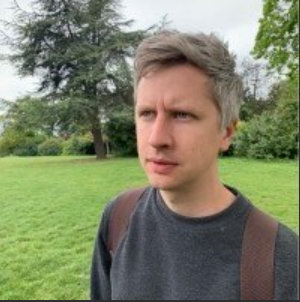Smuggling along the new silk road: The role of Global Trade Hubs (GTH)
Project Live
PROJECT TEAM
Professor Sami Bensassi
Professor Sami Bensassi is a Reader in Trade and Development Economics in the Birmingham Business School and is a member of the Centre for Crime, Justice and Policing. His research interests lie at the intersection of trade, development and institutions. His recent work has focused on trade informality, corruption and conflict zones. Dr Sami Bensassi's research appears in leading academic journals including World Development, The Journal of Development Studies, The Journal of African Economies and the Review of International Economics. He has received research funding from FCDO, the European Union, the Economic Research Forum and the IFPRI, and collaborated with the World Bank and the Food and Agriculture Organisation. He has received the University of Birmingham Outstanding International Impact for his research on smuggling at Tunisian land borders. He holds a PhD in Economics from the University of Paris-Nanterre.
Arisyi Fariza Raz
Arisyi is an applied microeconomist with research interests in financial intermediation. Currently he holds positions as a Lecturer in Finance at the Faculty of Economics and Business, Universitas Indonesia. He has published his works in leading finance journals such as Journal of Financial Intermediation and Journal of Corporate Finance, and presented at leading conferences such as the Econometric Society and the European Economic Association. He is also a certified Financial Risk Manager® (FRM).
Dr. Adam Nix
Dr. Adam Nix is an Associate Professor at the University of Birmingham. His research focuses on corruption, misconduct, and governance issues with a particular emphasis on energy, digital, and other strategic industries. As a historian and management scholar, he has published research on the manipulation of US electricity markets following their deregulation in the late-90s, and experiences of interpersonal misconduct among UK employees. Adam is also an expert in the use and preservation of digital organisational records and has previously worked with the National Archives and the University of Illinois on funding research in email as a historical source. His teaching focuses on issues of ethics, governance, and societal responsibility within a business and management context.
Dr. Mayya Konovalova
Dr. Mayya Konovalova is a Lecturer in Taxation and Anti-Money Laundering at Birmingham Business School. With 14 years of industry experience in financial services and compliance, her research examines transparency regulations, international financial standards, and trade-related financial crime. She has published “In Search of the Owner: Regulating Through Transparency” in Critical Perspectives on Accounting and the book chapter “Tax Havens: The Crisis of Transparency” in Global Tax Governance.
Dr. Yangjun Han
Dr. Yangjun Han is a Research Fellow at the University of Birmingham. Her research examines trade policy, foreign direct investment (FDI), and firm dynamics, with a particular emphasis on how firms respond to policy shocks and global uncertainty. She applies quantitative models to rich microdata to investigate issues such as the role of customs and logistics agents, focusing on how their evolving relationships with firms shape trade facilitation policies and practices.
Adam Blanden
Adam Blanden is an early-career researcher at the University of Birmingham with a PhD in International Political Economy (IPE) from King’s College London. His research interests lie in the field of global governance and politics, with a focus on how global politics interacts with monetary, financial stability and trade policy. He has researched democracy in economic policy making, the political values of central bankers and global governance and globalisation. His work has been published in Review of international Political Economy and British Politics, as well as numerous non-academic publications.
If you would like to find out more about this project, please contact Professor Sami Bensassi on s.bensassi@bham.ac.uk.
PROJECT SUMMARY
The new maritime Silk Road, part of the Belt and Road Initiative (BRI) launched by the current Chinese president 10 years ago, has been an essential tool of soft power for China and has contributed to the growth of established trade hubs and the development of new ones. We define Global Trade Hubs (GTH) along the maritime silk road as states for which trade represents an economic activity that, in terms of value, is superior to the Gross Domestic Product of the country and/or countries where new port infrastructure able to welcome large-size containership have recently been developed. These countries/cities are essential platforms to facilitate international trade between Europe and Asia. They have constructed a combination of physical assets (ports, airports, roads and/or rail connections), legal frameworks, dedicated services and institutions strongly supporting their roles in moving goods.
The project evaluates the role of Global Trade Hubs (GTH) along the maritime Silk Road in facilitating illicit activities, particularly smuggling, leveraging proven methods based on mirror trade statistics. By comparing these findings with existing assessments of illicit activities and flows, the project aims to provide insights into the potential risks associated with GTH involvement in illicit financial flows (IFFs). Additionally, the study explores the concept of stigma attached to certain trade hubs, such as the Seychelles, analysing its emergence and persistence.
The outcomes of this research carry significant implications for national and international policymaking regarding the risk assessment and categorisation of GTHs in relation to potential exposure to IFFs, and offers insights to guide future policy decisions.
PUBLICATIONS
-
Publications from this project will be posted here when available
RELATED PROJECTS
Combatting trade-based money laundering: Do the Financial Action Task Force recommendations bite?
The Financial Action Task Force (FATF) focuses on combatting money laundering. This research focuses on the impact of FATF recommendations on illicit financial flows and on tax avoidance and tariff avoidance. Learn more…
Exploring the Consequences of Organised Crime and Illegal Trade Displacement on Eurasia
This project by Dr. Marat and Dr Kupatadze aims to understand changing dynamics regarding threats in borderlands, actors in smuggling and trafficking, elite bargains and law enforcement capacity. Learn more…
Unlocking the black box of political will on IFFs: Going beyond technical responses
This research project seeks to better understand what enables illicit financial flows (IFFs), if there is political will to address these and what interventions have been successful in addressing IFFs as part of a politically sensitive approach. Learn more...









